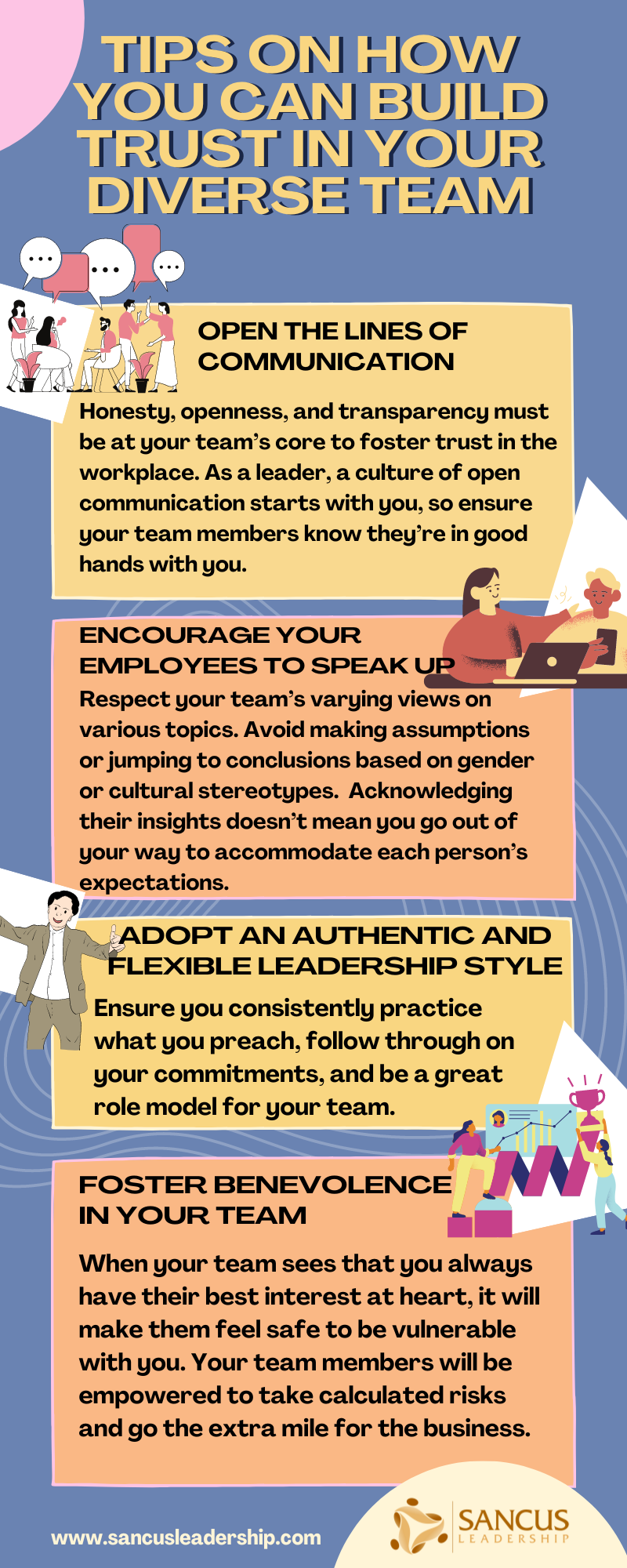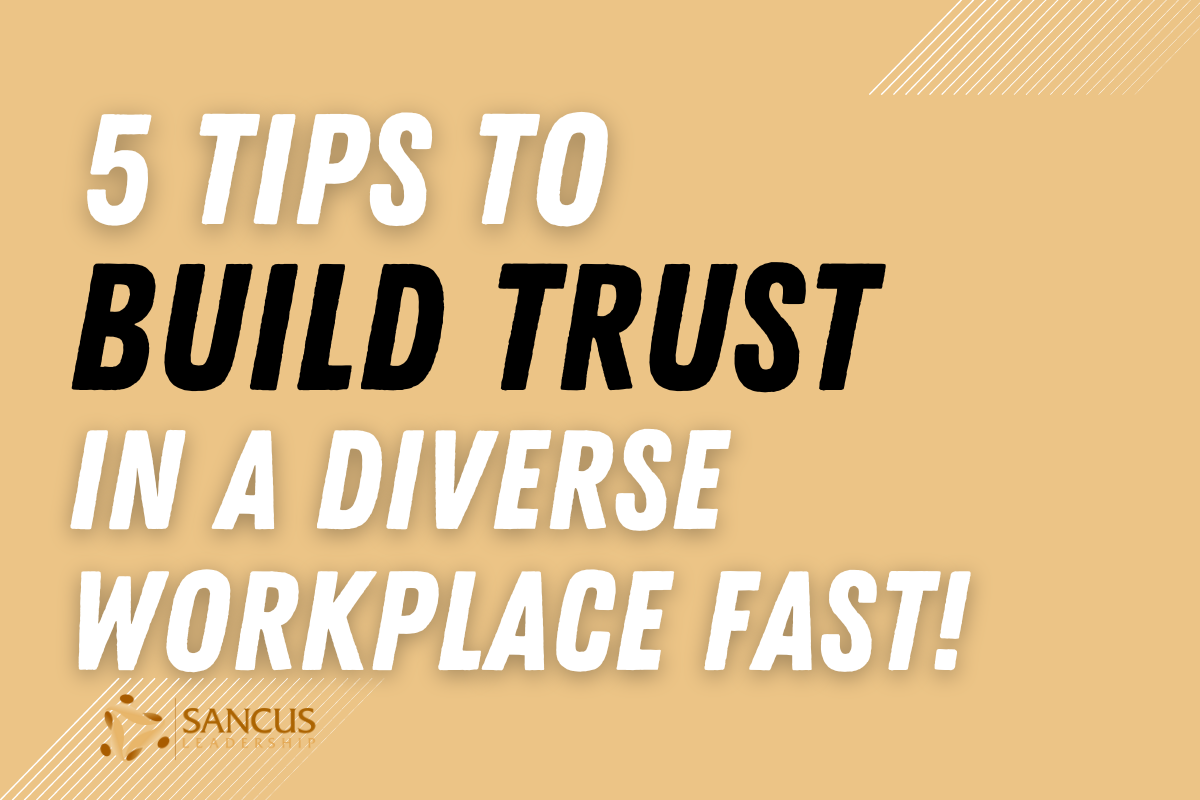Employees seek organizations where they will be acknowledged, supported, and respected regardless of their personal choices, characteristics, or beliefs. But does this mean that, as a leader, you must heed and adapt to all the varying expectations, possibly compromising your authority? Creating a diverse culture in your organization is crucial to being relevant in today’s world, but how do you go about it?
Building trust in a diverse workplace is the first step toward creating a united and synergistic team. Set the standard by keeping communication lines open, encouraging employee engagement, and being an approachable, practical leader. Express that you always have the best intentions for your team.
Read on to find out how you can foster trust in a diverse team where confusion, misunderstandings, and feelings of discrimination may always threaten the team’s synergy, efficiency, and productivity. We will talk about the value of transparency, openness, and integrity as a leader and how these values can quickly reflect how your team members interact with you and one another.
How Do You Build Trust in a Diverse Workplace?

In a diverse workplace, equal opportunities and rights are given to all team members regardless of race, sexual orientation, age, religious beliefs, or physical abilities. In today’s highly interconnected world, this is an excellent concept to adapt in the workplace because it allows you to take advantage of the varying skill sets, backgrounds, and experiences various individuals bring with them to the table.
Collaboration and trust may take a backseat in such a workplace environment, considering the distinctiveness of your team members. A diverse population in the workplace might push them to become more independent of each other, and they might prefer to work autonomously.
Not cultivating an open, trusting environment in a diverse workplace can create a hostile environment and culture. Your team members may eventually find it undesirable to work in your team because it’s uncomfortable, stressful, and perhaps even cruel. You may soon note these changes in the workplace:
- You’re no longer attracting high-quality workers to your team.
- Team efficiency and productivity take a dip.
- Employees are not aligned with the team’s values and goals.
- The atmosphere in the workplace is stiff and uninviting.
Is Trust Essential in a Diverse Workplace?
Fostering trust in a diverse workplace is crucial because it helps build a positive, collaborative culture in which driven individuals are motivated to strive for excellence. Your company will benefit in the long run with enhanced productivity, better team engagement, and higher revenues.
Here are some of the top reasons why it’s essential to foster a high-trust work environment:
- Boosts employee retention and loyalty to the team. 2016 Fortune 100 Best Companies to Work For® noted just a 10% employee voluntary turnover rate (employees who voluntarily quit their jobs) — a 50% lower turnover rate than other companies within the same industries.
- Boosts company profitability. High-trust companies are 2 ½ times more likely to enjoy higher revenue growth and profits than those that don’t cultivate trust in the workplace.
- Enhances teamwork, engagement, and innovation. Disengagement at work costs US companies $450 billion – $550 billion yearly. To be fully engaged, employees must feel safe about being open and vulnerable to the team.
- Enhances decision-making processes. Team members are empowered to make intelligent decisions because leaders believe they can help steer the team in the right direction. Their unique backgrounds, skill sets, and experiences will give a broader range of viewpoints on various topics.
| Top reasons why it’s essential to foster a high-trust work environment | Description |
| Boosts employee retention and loyalty to the team | This increases productivity, knowledge sharing, and innovation while reducing hiring costs and conflicts. Overall, a high-trust work environment enhances job satisfaction and organizational culture and ultimately contributes to the company’s long-term success. |
| Boosts company profitability | A profitable company can invest in its employees’ development, benefits, and work-life balance, further strengthening the bond of trust and commitment between the organization and its workforce. Ultimately, a high-trust work environment and enhanced company profitability go hand in hand, driving overall success and sustainability for the business. |
| Enhances teamwork, engagement, and innovation | Enhancing teamwork, engagement, and innovation in a high-trust work environment creates a positive feedback loop. Trust facilitates effective teamwork and collaboration, which, in turn, boosts employee engagement and fuels creativity and innovation. This virtuous cycle strengthens the organization, improves its performance, and fosters a work culture where employees feel valued, supported, and motivated to excel. |
| Enhances decision-making processes | Enhancing decision-making processes in a high-trust work environment cultivates a culture of openness, collaboration, and confidence. This leads to more effective and inclusive decisions, increased employee engagement, and a positive work environment that fosters loyalty and long-term success for the organization. |
At Sancus Leadership, we promote cultivating core values, including trust, in the workplace to make it more conducive for working efficiently and synergistically in a team. Diversity and inclusivity can give you significant leverage in your industry, so book a free leadership call with us when you’re ready to take your team a step further toward success.
Here are some tips on how you can build trust in your diverse team:
1. Open the Lines of Communication
Honesty, openness, and transparency must be at your team’s core to foster trust in the workplace. As a leader, a culture of open communication starts with you, so ensure your team members know they’re in good hands with you.
Honesty, openness, and transparency must be at your team’s core to foster trust in the workplace.
Keep these pointers in mind:
- Set your expectations so the employees understand their roles and how they fit in the bigger picture.
- Be honest with your team, whether you’re sharing good or bad news.
- Encourage accountability by owning up to your mistakes and shortcomings.
- Give regular feedback to your team so they stay informed and connected.
2. Encourage Your Employees To Speak Up
Strengthen employee-employer partnership by allowing them to have a decisive share of voice in the team. In a survey, 63% of employees think their employers exercise excessive power over their lives, while only 58% believe they possess authority over their careers.
Employees appreciate a more proper power balance in the employee-employer relationship. It would be best if you allowed your team members to share their insights on critical business issues, participate in crucial decision-making processes, and brainstorm with you when creating concepts or drafting plans concerning the team.
Respect your team’s varying views on various topics. Avoid making assumptions or jumping to conclusions based on gender or cultural stereotypes. Remember, acknowledging their insights doesn’t mean you go out of your way to accommodate each person’s expectations. As a leader, you must show that you consider each person’s contributions to help you do what’s right and best for the team.
Respect your team’s varying views on various topics.
Make your team realize and understand that you fully support positive diversity because you acknowledge that this is highly advantageous for the business. You appreciate and consider your team members’ varying opinions, insights, skills, backgrounds, and experiences because all these contribute toward making your business more distinctive, responsive, versatile, and comprehensive.
3. Adopt an Authentic and Flexible Leadership Style
Successfully leading a diverse team requires gaining your team members’ confidence. It indicates how well your team can function synergistically under your guidance. Trust is necessary for your team members to see you in a positive light, and it will be much more challenging for you to exert your rights and authority as a leader.
Positive relationships, good judgment, and consistency are 3 of the main factors that drive trust. Show your team you’re worthy of their faith by always leading with integrity. Ensure you consistently practice what you preach, follow through on your commitments, and be a great role model for your team.
Ensure you consistently practice what you preach, follow through on your commitments, and be a great role model for your team.
Your leadership style must reflect your eagerness to form synergistic partnerships with your team and your commitment to helping them achieve their full potential.
4. Foster Benevolence in Your Team
Benevolence is the quality of being kind and well-intentioned. It will cultivate a culture within your diverse team where everyone thinks and acts in the organization’s best interests. When this is achieved, trust becomes a core value in the group and will enable everyone to collaborate and work together toward the business’ growth and success despite their differences.
When your team sees that you always have their best interest at heart, it will make them feel safe to be vulnerable with you. Confusions and misunderstandings will be quickly sorted out before they become issues in the team. Your team members will be empowered to take calculated risks, go the extra mile for the business, and not feel imperiled whenever they exert a bit of independence and innovation.
When your team sees that you always have their best interest at heart, it will make them feel safe to be vulnerable with you.
A friend shared how a colleague of hers, Josie, had a rough start a few years back when she joined an investment firm as a fledgling, short on experience but undoubtedly eager to build her credentials in this new field. Josie joined a team of experienced financial advisors headed by a leader known in the organization for being particularly adept in the ins and outs of investments, thus having an enviable client portfolio to show for it.
Josie soon found the leader quite dominating and aggressive, and she wasn’t comfortable at all about voicing her concerns and uncertainties, even merely asking for clarifications on essential matters. To make matters worse, the leader seemed to place a higher premium on commissions earned rather than helping clients manage their finances better. Josie found this extraordinarily upsetting and completely misaligned with her values.
Josie left the team and searched for greener pastures, somewhere she’d be appropriately guided by a firm yet supportive and ethical leader. She’s much happier now where she is and is thriving as one of the significant contributors to her team.

In this talk below, Simon Sinek discusses how important it is to build a trusting working environment so people can work at their natural best.
Final Thoughts
Working in a diverse workplace can be invigorating, challenging, and rewarding, but this will only be possible if trust is at the group’s center. Faith is necessary for diversity to be a menacing, confusing, and exhausting factor to battle daily. A team that isn’t united, synergistic, and harmonious will not be as efficient and productive as possible.
Leading and managing a diverse team can be challenging, but a positive mindset will make this endeavor extremely rewarding. You must be as transparent as possible, promote engagement, and exhibit high levels of integrity in your leadership style.



